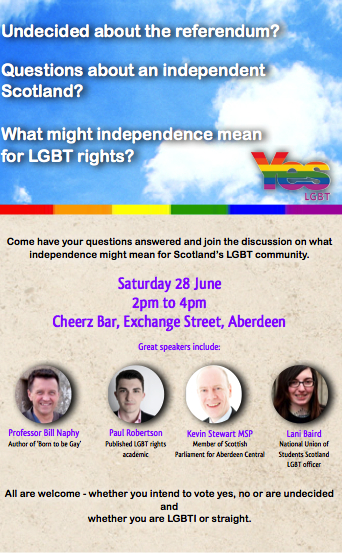By Paul Robertson.
Pride season is upon us and cosmopolitan cities across the world will shortly be celebrating the contributions of their gay populations – from London to Tel Aviv, from Berlin to Toronto.
This year is as good a year as any to go along to one if you haven’t already ticked that off your list.
It’s not all about half-naked male models gyrating on flamboyantly-decorated floats – although that is a particularly enjoyable aspect.
My personal hope is that when Pride Scotia rides into Edinburgh this year, we will take stock of just how far the LGBT community in Scotland has come – from decriminalisation in 1980 to the passage of a bill allowing gay people to marry just last year.
I hope, also, that we will take a moment to consider what the referendum on independence for Scotland might mean for our community.
Amidst a lively debate on independence, it has been difficult consider just what becoming independent might mean for LGBT people living in Scotland. The announcement this week of a draft Constitution for an independent Scotland provides us with that much awaited opportunity to engage as a community in the debate.
Scotland is no egalitarian utopia. Societal attitudes remain stubbornly conservative in some parts of the country and LGBT people still do face discrimination and homophobia in everyday life.
However many in the LGBT community will be heartened to see that sexual orientation has been named in the draft Constitution as a specific grounds upon which discrimination will be banned. Should Scotland become independent and that constitution adopted – our country would be only the second in the world to provide a constitutional protection for LGBT people. That is of enormous symbolic value.
A new Scotland that places protection for the rights of all people at its heart will be an achievement that we can all share in, particularly communities like the gay community which has faced such adversity.
LGBT communities around the world continue to struggle for the most basic of rights. Whilst we in Scotland have spent the last years campaigning to have our right to have our love for each other recognised, LGBT people in Uganda or Russia have been struggling to have their right to even live be recognised.
The struggle for basic human rights for all in the world remains the biggest challenge of the 21st century. It is not a fight that can be won with nuclear weapons or military might. It is expressions of soft power, of exemplary commitments to human rights, and of positive engagements with groups and governments that will move societies across the world to recognise the value of each human life.
 From our groundbreaking law on equal marriage to our commitment to enshrining the rights of our LGBT Scots in a constitution; I have become convinced that Scotland has an important contribution to make for LGBT people living all over the world.
From our groundbreaking law on equal marriage to our commitment to enshrining the rights of our LGBT Scots in a constitution; I have become convinced that Scotland has an important contribution to make for LGBT people living all over the world.
What would the foreign policy of a new Scotland be focussed on? Bombing Middle East countries or vociferously pursuing the human rights of the world’s marginalised peoples? Supplying dictators with weapons designed to kill and oppress or supplying groups with the resources needed to bring positive change to their societies?
A mould of a new Scotland is emerging and it is one that we can all contribute to shaping.
I believe wholeheartedly that we as an LGBT community should grasp independence with both hands – not just to secure a Constitution that protects us and offers a final confirmatory victory for equality for ourselves – but so that we can strive to secure those rights for others around the world, too.
LGBT people in Aberdeen have the opportunity to engage in this debate at a special event What will independence mean for LGBT rights? being held in Cheerz Bar on Saturday 28 June, 2pm to 4pm.
- Comments enabled – see comments box below. Note, all comments will be moderated.
